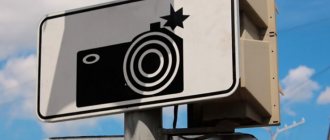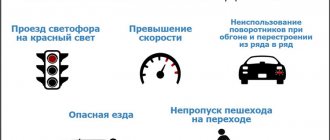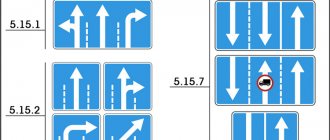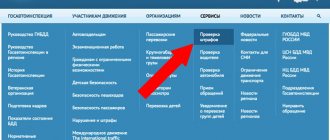How can you avoid paying fines from traffic police cameras?
How to avoid paying fines received from photo and video cameras...
There is probably not a driver in our country who has not received fines from photo and video cameras for traffic violations. In most of these cases, when receiving a fine from a traffic police camera by mail, drivers try to pay it as soon as possible. Especially since the legislative level introduced a 50% discount on the payment of fines for traffic violations within 20 days from the date of the decision to bring to administrative responsibility.
What do you friends think, is it possible to legally avoid paying such fines to the traffic police for photos and video recordings obtained from cameras? Are you hesitant to answer this? It turns out it is possible. But we recommend doing this only to those drivers who do not agree with the decision to impose administrative liability.
What then should those drivers do who have not received such a resolution and only learned about such a fine from a traffic police camera from bailiffs? We invite you, dear motorists, to familiarize yourself with the guide, which will explain to you in detail how you can legally avoid paying fines received from photo and video cameras of the traffic police.
Attention! This guide is not a guide for those who want to legally avoid administrative liability for violating traffic rules. This material of ours is published purely for informational purposes and was selected with only one purpose, to help drivers and car owners of vehicles who were either illegally brought to administrative responsibility or, due to the negligence of traffic police officers or poor quality work of the Russian Post, did not receive theirs on time address the decision to bring them to administrative responsibility for violating traffic rules, which ultimately led these drivers to miss the legal deadline of 20 days to appeal this decision.
Responsibility for non-payment of the fine amount
The procedure for executing punishment for evading the fulfillment of monetary obligations that arose after identifying a case of violation of the rules of the DD is established by Article 20.25 of the Code of Administrative Offenses of the Russian Federation. Based on its provisions, a fine amount not paid in a timely manner may be subject to a new administrative sanction of double amount. Moreover, it must be paid separately from the original amount. As a result, the culprit will be punished three times.
In addition, the norm provides for his arrest for up to 15 days or community service for up to fifty hours.
Liability in the form of arrest does not apply in case of failure to comply with the established procedure recorded by road video recorders. The violator can only be fined or required to perform a certain type of work. It should be noted that such sanctions can only be applied by court decision. In this case, the decision cannot be made in absentia, and the period of execution of the punishment is limited to 3 months from the moment the debt arose.
Where can you check traffic police fines?
Currently, there are many different online services on the Internet that provide information about administrative fines imposed on drivers and vehicle owners for violating traffic rules. Unfortunately, such a number of different services does not indicate the quality of the services they provide.
The point is this: many services, by their nature, simply duplicate the available information from the official website of the State Traffic Safety Inspectorate and the State Services website, where these services are located, which allow you to request online information about accrued fines for traffic violations. Also, many non-governmental services that provide online information about traffic police fines often contain not entirely objective and up-to-date information that is not accurate or outdated, and therefore can mislead those citizens who use these services. In this case and based on this, we recommend that drivers and car owners use only the following government online services for checking traffic police fines, that is, the following online services:
- 1. On the official website of the traffic police (gibdd.ru)
- 2. On the official website of State Services (gosuslugi.ru)
Let us, gentlemen, consider the following situation. The resolution on bringing to administrative responsibility and imposing a fine for violating traffic rules did not reach you or you simply did not receive it at the post office for some reason (intentionally, or due to poor performance of the Post Office).
Before we directly move on to the description of the legal way not to pay traffic fines received from photo and video recording cameras, let’s first find out what will happen if you don’t pay fines from traffic police cameras?
Pay your attention specifically to the fact that if debit plastic cards have been issued in your name at Sberbank PJSC of Russia, at this (today) moment, according to the law, in case of failure to pay a fine for violating traffic rules within the period established by law, they can unilaterally automatically write off the amount of received fines that were imposed in your name by the traffic police.
See also: How to pay for parking?
Please also note that this can happen even in cases where you have not received a decision to hold you administratively liable and impose a fine on you.
Our editorial office often receives complaints from drivers who claim cases of double debiting of money from Sberbank cards for the same traffic violation. In these cases, citizens have to demand the return of excess amounts written off from Sberbank cards. But this is not so easy to do, since the bank writes off these amounts on the orders of the Bailiffs.
See also: Cancellation of tax notices by mail for payment of transport tax
In this case, you need to keep in mind that in order to get your money back and at the same time return the automatically debited payment from the bank card back to your account, you will first have to contact a bailiff.
By the way, if you think that this cannot happen to you specifically because you always pay fines for traffic violations on time, then you, my friends, are mistaken. How else can it happen? And there are quite a few such cases throughout our large country. For example, such a debit from a bank card can occur even if the information about your payment of the fine has not reached the bailiff.
In this case, the bailiff, due to his lack of information about payment of the fine, will issue a decision to write off this fine debt from your bank account opened with Sberbank PJSC. After which this resolution will be sent directly to the bank, which in turn will take and immediately write off from your account linked to your bank card the required amount of the fine issued to you by the traffic police.
So, friends, keep in mind that paying a fine by you does not mean that information about it will come to the traffic police and the bailiff service on time or at all. After all, it often happens when banks simply delay, for their own reasons, the transfer of information about paid fines to the traffic police, and it often happens when the traffic police, for some reason, forgets to inform the bailiffs about received payments for fines. As a result, it turns out that even conscientious drivers who paid the fine on time can be considered debtors in the bailiff database for a long time.
Legal basis
According to Article 32.2, paragraphs 1 and 1.3 of the Code of Administrative Offenses, an administrative fine, including for traffic violations recorded by an autonomous surveillance system, is payable:
- in one hundred percent amount - within 60 calendar (not working!) days from the moment the court makes the relevant decision or from the end of the deferment;
- half the amount - if the motorist has paid the state within 20 calendar days from the same moment.
If a citizen, without good reason, which he can later confirm in court, does not pay the money within the specified period, he, in accordance with Article 20.25, paragraph 1 of the same document, will be punished in the form of:
- imposing a fine of double the amount, not less than 1 thousand rubles;
- compulsory work lasting up to 50 hours, starting from the actual time of departure;
- administrative arrest lasting up to 15 days, depending on the court decision.
In addition, as follows from Article 32.2, paragraph 5 of the said code, if after the expiration of the 60-day period the payment was not documented and information about it was not entered into the GIS “State and Municipal Payments”, the person who issued the decision to impose a fine:
- Prepares a new copy of the document using data already available in the system.
- Within 10 calendar days from the date of drawing up the resolution, it is sent to the Federal Bailiff Service for direct debt collection. The duplicate can be sent either using postal communications or via a telecommunications network (via the Internet); in the latter case, it is, in general order, certified by an enhanced electronic digital signature of the responsible person.
- In accordance with Article 20.25, paragraph 1 of the same code, the bailiff or judicial authority in charge of the case draws up a protocol on a new offense, providing for one of the penalties listed above.
Having a resolution in hand, the bailiff can either communicate personally with the debtor or contact the bank to write off the fine amount from the offender’s account. The last option is simpler and therefore more likely to be used.
Practical use
In reality, everything is more complicated. Firstly, since the number of recorded violations of traffic rules, and therefore decisions to impose punishment, is constantly growing, the justice authorities actually lose the ability to process each episode, and some cases simply remain without progress. This is beneficial to the driver, but you should not hope for a lucky break: it is impossible to predict which cases will come to the attention of a judge or bailiff and which will not.
Secondly, payment processing by the bank also takes time. In accordance with Article 32.2, paragraph 3 of the Code of Administrative Offenses, settlements with the state can be made by the offender only through a bank, and this implies the inclusion of a new unpredictable factor in the case. If the credit institution does not have time to complete the transaction on time (which, however, happens less and less often), and the deadline for executing the decision is already running out, a new protocol may be drawn up in relation to the motorist, according to Article 20.25 of the same document - and an additional amount will be withdrawn from his card .
To avoid trouble, it is recommended to pay the fine in advance - preferably no later than 20 days from the date of the relevant decision, but at least three to four days before the expiration of the 60-day period.
When does a decision on traffic violations recorded by traffic police cameras come into force?
According to the legislation (Article 31.1 of the Code of Administrative Offenses of the Russian Federation), this Administrative Resolution on violation of traffic rules comes into force, namely:
- after the expiration of the period established for appealing a decision in a case of an administrative offense, if the said decision was not appealed or protested;
- after the expiration of the period established for appealing a decision on a complaint, protest, if the said decision has not been appealed or protested, except in cases where the decision cancels the decision;
What is the deadline established by the Code of Administrative Offenses of the Russian Federation for appealing a decision in a case of an administrative offense?
According to Part 1 of Article 30.3, this period is 10 days from the moment of delivery or receipt of a copy of the resolution to bring a person to administrative responsibility.
Accordingly, in addition to 60 days to pay the fine, you have an additional ten days, which are provided for appealing the administrative decision to hold you accountable for violating traffic rules.
But again, this is all in theory. If you think that you will not receive a resolution to bring you to administrative responsibility and it will not enter into legal force, then you gentlemen are mistaken. You need to know that our legislation is very contradictory and confusing. As a result, our country has developed a special practice for the entry into force of decisions on bringing to administrative responsibility.
Here's the thing. Part 1 of Art. 30.3 and Art. 31.1 of the Code of Administrative Offenses of the Russian Federation stipulates that a decision on bringing to administrative responsibility comes into force after 10 days from the date of delivery or receipt of a copy of the decision, if it has not been appealed or protested, but the officials and bodies that issued the decision are also guided by other norms legislation, namely:
Thus, in accordance with Part 2 of Article 29.11 of the Code of Administrative Offenses of the Russian Federation, a copy of the resolution on bringing to administrative liability (in our example, a resolution on violating traffic rules and imposing a fine from a photo and video camera) is sent within 3 days to the place of residence of the owner of the vehicle, with the moment the decision is made.
If a copy of the resolution imposing a fine for traffic violation was not received by the person who was brought to administrative responsibility, then it is returned to the body that issued the resolution. In this case, the body that issued the decision on a fine for violating traffic rules is guided by the current rules for the provision of postal services in the Russian Federation.
Thus, according to paragraph 36 of the “Rules for the provision of postal services in the Russian Federation”, the postal item is returned to the sender, in particular, if the addressee (or his legal representative) refuses to receive it, as well as in the absence of the addressee at the specified address.
Accordingly, the date of entry into force of the decision in an administrative case for violation of traffic rules will be considered the date of receipt of a copy of the decision back to the body that issued this decision, i.e., due to the absence of the person brought to administrative responsibility at the residence address, or a person who has evaded receiving a decree by mail against receipt.
Thus, in our country there has been an ambiguous practice of the entry into force of decisions on administrative offenses. Therefore, friends, if you have not received a decision on an administrative offense by mail, this does not mean that it has not entered into legal force. Especially if you take into account the fact of how Russian Post works in our country.
However, it is still possible to appeal a fine from traffic police cameras that has entered into force.
Thus, according to Part 2 of Article 30.3 of the Code of Administrative Offenses of the Russian Federation, in the case of a 10-day miss to appeal a decision on an administrative offense, this period can be restored by a judge or officials who are authorized to consider such complaints about missing a deadline.
Now we have come to the most interesting thing in our legislation, which can really help you avoid paying many fines from traffic police cameras. Here's what you should do to achieve this. However, we draw your attention to the following, namely, that our goal of this article is not to teach drivers how to evade responsibility for violating traffic rules.
For our part, we still recommend that drivers pay all traffic fines received to them on time. This is especially true now, when the law provides for the possibility of paying only 50% of the amount of the imposed fine in the first 20 days.
We would also like to draw your attention, friends, to the fact that this article of our material, which tells how not to pay traffic fines legally, can help precisely those drivers and car owners who were illegally brought to administrative responsibility and unfortunately missed the 10-day the period for appealing the decision on fines specifically because of the traffic police, who may not have sent such a decision at all to the place of residence of the person held accountable, as well as because of the unsatisfactory work of the Russian Post, which may have simply lost such a decision to bring you to administrative responsibility .










